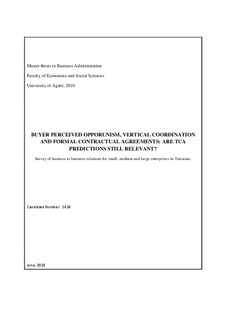| dc.contributor.author | Chao, Emmanuel James | |
| dc.date.accessioned | 2010-10-05T12:14:03Z | |
| dc.date.available | 2010-10-05T12:14:03Z | |
| dc.date.issued | 2010 | |
| dc.identifier.uri | http://hdl.handle.net/11250/135528 | |
| dc.description | Masteroppgave i økonomi og administrasjon - Universitetet i Agder 2010 | en_US |
| dc.description.abstract | This study was based on survey that involved small, medium as well as large enterprises which were engaging in buyer-supplier business to business relations in Tanzania. The aim was to use some key dimensions from TCA as well as RCT, and RDT, and test some existing relations from developed economies literature and compare it with the outcomes in developing economies and Tanzania in particular. Key concepts which were analyzed in this study are buyer perceived opportunism, vertical coordination and formal contractual agreements.
Data collection mainly used primary sources and very small part used secondary sources. Primary data collection used structured and closed questionnaires, which were distributed to buying firms as the respondents.
Quantitative data analysis was a major form of analysis used. It involved descriptive statistics such as percentage, means and standard deviation. In evaluating the essence of variables used for the analysis, the study used factor analysis together with KMO and Bartlett‟s test. On the other hand the analysis for testing the predicted relations involved the use of correlation matrix as well as bivariate and multivariate data analysis methods.
In this study buyer asset specificity was found to increase level of buyer perceived as was predicted, while the moderating effect of behavioral uncertainty and performance ambiguity were as well significant and consistent with predictions. On the other hand contractual flexibility was found to have a significant positive impact on vertical coordination in accordance to hypothesis. The negative impact of environmental uncertainty and the positive impact of buyer asset specificity on formal contractual agreement were found to be significant as predicted but a huge negative effect of buyer dependence on this relationship was also supported and it turns out that this variable is a strong predictor of formal contractual agreement far more than buyer asset specificity. Most of the tested relations did not reveal significant differences between developed economies TCA empirical findings and those from developing economies, except for insignificant impact of environmental uncertainty on vertical coordination, suggesting the relevance of TCA in predicting these concept in developing economies as well and Tanzania in particular. | en_US |
| dc.language.iso | eng | en_US |
| dc.publisher | Universitetet i Agder ; University of Agder | en_US |
| dc.subject.classification | BE 501 | |
| dc.title | Buyer perceived opporunism, vertical coordination and formal contractual agreements: are TCA predictions still relevant? : survey of business to business relations for small, medium and large enterprises in Tanzania | en_US |
| dc.type | Master thesis | en_US |
| dc.subject.nsi | VDP::Social science: 200::Economics: 210::Business: 213 | en_US |
| dc.source.pagenumber | 105 s. | en_US |
